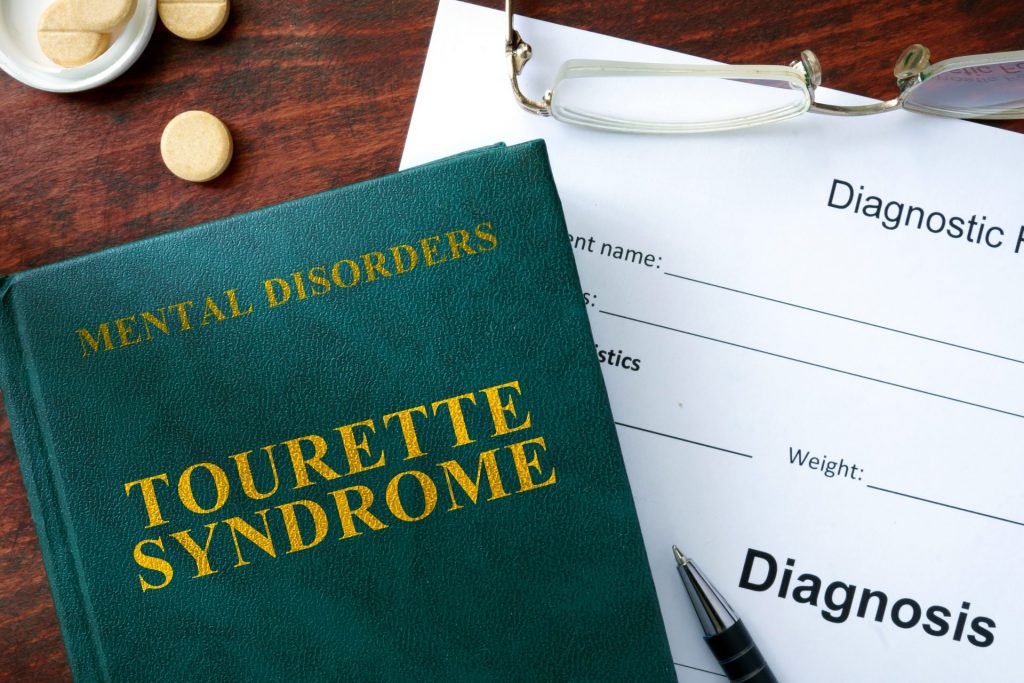Tourette Syndrome, also known as Tourette’s or TS, is a neurodevelopmental disorder distinguished by the presence of chronic motor and vocal tics. The severity of TS can vary; according to the NINDS, it is estimated that one in 100 have a mild case, and around 200,000 Americans suffer from the most severe form of Tourette Syndrome.

Symptoms typically appear during childhood, and in many cases, the severity of one’s tics reaches its peak around the pre-teen years with symptoms improving post-adolescence. However, for some individuals, Tourette’s is a chronic lifelong condition with its own set of daily challenges to cope with.
What Are Tics?
Tics are uncontrollable movements, gestures, or vocalizations that are often sudden and repetitive. Tics are described as either simple tics (involving a limited number of muscle groups) or complex tics (involving several muscle groups).
The specific type of tics a person has and their frequency typically fluctuates over time. Tics can also change, evolve, or even react to internal or external triggers, including anxiety or stress.
Many people with Tourette’s notice their tics lessen or stop altogether if they are intensely focused on something. Some people may also experience premonitory urges — a sense that a tic is about to occur. While some may be able to suppress a tic when this happens, it can often make tics emerge more frequently afterward.
Motor Tics
Some examples of simple motor tics are grimacing, blinking, shrugging, and jerking movements. Complex motor tics can include jumping, twisting, hopping, or a combination of movements. More severe motor tics can include obscene gestures or actions such as hitting or punching that can cause self-injury to the individual.
Vocal Tics
Simple vocal tics can include barking, sniffing, whistling, or popping noises. Complex vocal tics typically involve words or phrases.
- Echolalia is a type of vocal tic where the individual repeats something that someone else has said.
- Coprolalia is a severe vocal tic involving inappropriate or crude language like swearing or racial slurs. It is perhaps one of the most heavily stigmatized symptoms, although only approximately 10%-15% of those with Tourette’s have this kind of vocal tic.
Living with Tourette’s
Many people with Tourette Syndrome don’t need any kind of medication for their condition, although it may benefit certain cases. Typically, the most effective ways to live with Tourette’s are to find healthy coping mechanisms and a support system that will help the individual live without their condition hindering their ability to live a normal life.
Options for Treatment
When it comes to treatment, speech therapy, behavioral therapy, or medication may be beneficial in some cases. Most often, there is no formal treatment necessary for Tourette’s unless the person’s tics are causing harm to the individual. In some cases, Tourette Syndrome can be accompanied by other conditions such as ADHD, anxiety, sleep disorders, or issues with social functioning, sensory processing, or behavior. Certain therapies can often help with concurrent problems in those with Tourette’s.
If you or a loved one suffer from symptoms of Tourette’s or any co-occurring conditions, Pandora’s House Psychiatry is here for you. Serving the Collin County community, we are committed to providing compassionate psychiatric care with understanding and trust. Contact us today for more information or to request an appointment.
